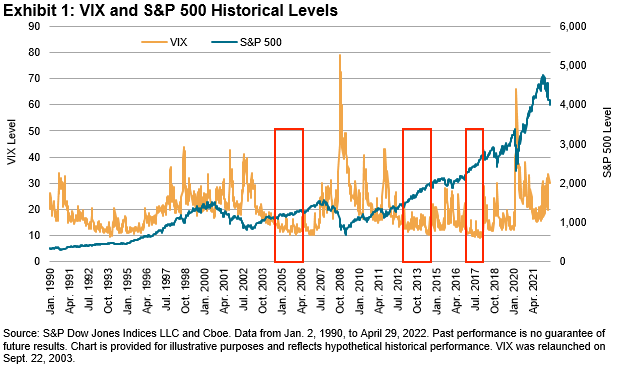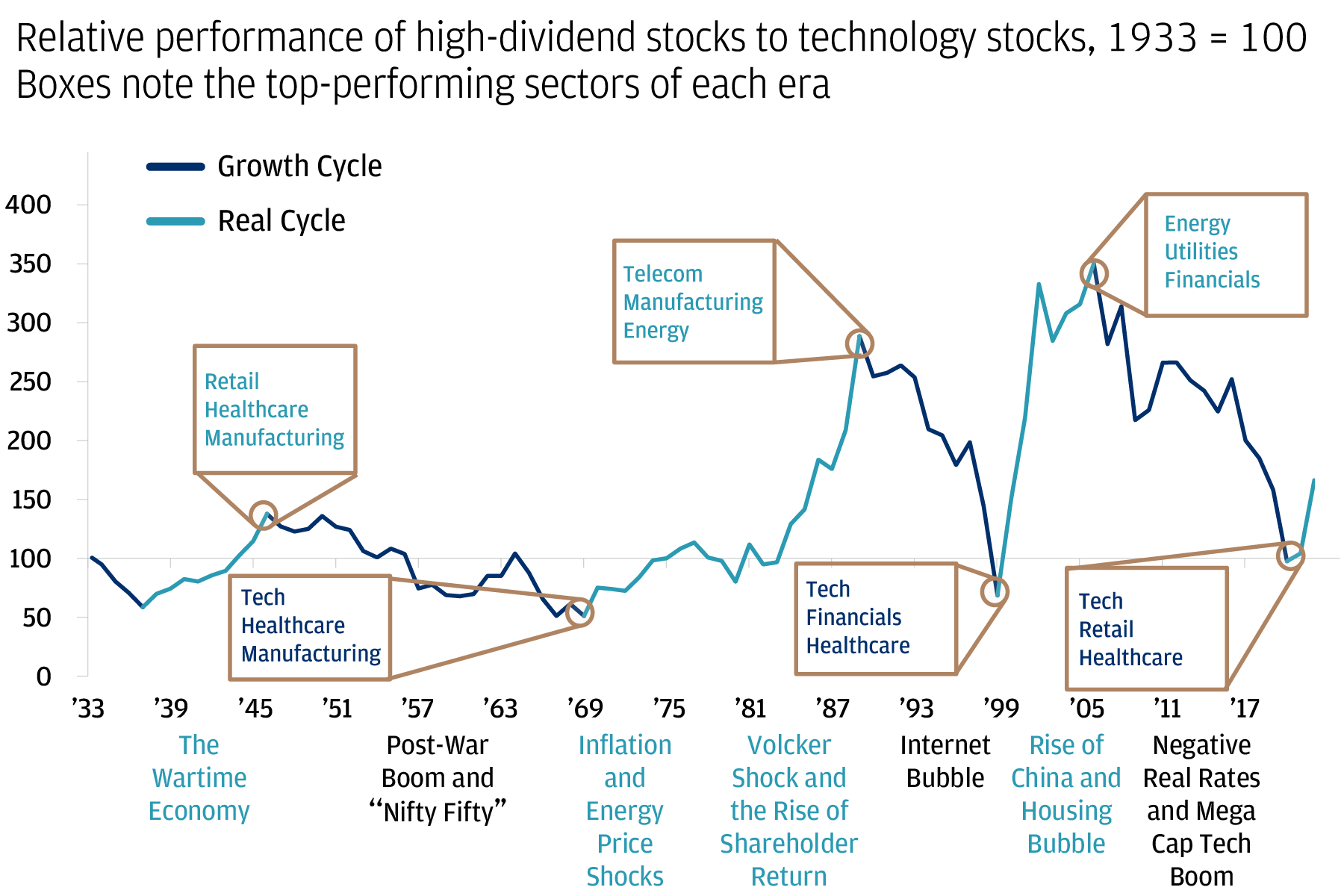2024 looks like 2005 and 2017 for stock market investors - and it's a bullish signal
What do the years 2017, 2013, and 2005 have in common? No idea? Neither did I, until I talked to Harry Colvin, Director and Senior Market Strategist at Longview Economics. Colvin illuminates that in each of those years, volatility remained subdued and it did not prove to be a sign that investors were too complacent. Low volatility was no hindrance as stock markets continued to rally because corporate fundamentals were so good. (Usually, low volatility is a warning signal for complacency among the consensus.)
Why am I bringing this up now? Because the rest of 2024 (or at least the next six months) in Harry's view, could be a repeat of 2017, 2013, and 2005. You can see what Colvin is getting at in this chart from S&P Globa,l which compares the US volatility index (VIX) to the S&P 500. I've drawn bars around each of the periods to demonstrate the periods of subdued volatility in question.

Beyond that, however, Harry argues the next 12 months could provide a window for investors to take advantage of a change in global stock market leadership.
Colvin sat down with me this week to discuss his views on today's markets, and this wire summarises our conversation.
Volatility is not a bad thing - this time
The number of headwinds for equity markets have been stacking up for some time - only in theory of course. Relatively extreme stock market concentration levels, the ongoing risk of sticky inflation, relatively depressed consumer confidence, and weak household spending in many of the major economies should derail this stock market rally. So why the positivity?
"Ultimately, the economic expansion and the trend in equities are all driven by the corporate sector, and the corporate sector is in great shape. Profits are trending up, cash flow is strong, and margins are expanding," Colvin argued.
"Corporate sector risk is relatively low, which is quite normal at this stage in the cycle. You've got credit spreads that are staying tight and even tightening further."
He goes on to add:
"It's possibly turning out to be one of those years where volatility dies - a death a bit like 2017 and 2013 and 2004 and other years like that."
What could upset this thesis?
Longview's research suggests five key reasons why this thesis could be upset:
- The ongoing risk of a US recession
- The risk that inflation remains sticky and therefore leads to further Fed tightening
- The risk of a liquidity crunch in the US Treasury - a big crunch could create massive problems for bonds, which filters through to the rest of the markets
- Valuation is not a good market timing tool - and there may be bubbles forming in the background in some specific sectors and stocks
- What will Chinese policymakers do to defend (or devalue) the Yuan? The answer to this question will say a lot about China's economy - which has big ramifications for Australian investors
So what's the playbook?
It turns out that unless you play in very short time horizons, buying NVIDIA and letting it take care of itself may not be the answer.
"NVIDIA is a $3 trillion company now. So is that is that going to go to four trillion or five trillion? We've got serious doubts about that, and there's a lot of good news in the price."
"Not only do we have a very expensive growth part of the equity market in the US where everyone is long and the positioning is crowded, everyone's bought in. One day, no doubt, flows will haemorrhage from that sector and rotate into other parts of the world."
Colvin says this observation is not just true for big tech but also for the US stock market as a whole. Seven of the 11 S&P 500 sectors are trading on a forward P/E ratio that is in the 80th percentile or above, relative to history. In other words, the valuations in seven stock market sectors are now more expensive than they have been 80% of the time.
Is it time to buy ex-US stocks?
As markets go through fashions, different sectors and themes will lead at different times. A perfect example, just looking at the US equity market alone, can be seen in this chart from J.P. Morgan Private Bank. At various times, "growth" stocks like tech and healthcare will lead, and at other times, "value" or "real" economy-oriented sectors like energy and financials names will lead the charge.

But just as stock market sectors have fashions, so do regions. US stock market leadership has been particularly pronounced since 2010, but Colvin believes that fact may change in the next few quarters.
"Leadership switches in the global equity market. They happen once every 6 to 8 years on average, and they happen when you've got a combination of extreme valuation divergence between the leading part of the equity market [US] and the lagging part of the equity market [Rest of the World, especially Europe]," Colvin said.
"They also happen when there's a changing macro theme. I think there's a good argument we've got that coming, as we get rate cuts in the West which generates a phase of strong above-trend growth in Europe," he added.
In recent months, Longview Economics have been arguing that it is time to shift global equity market exposure from the US towards Europe (including UK) - specifically in tech, industrials, and financials stocks. All three sectors have outperformed the S&P 500 and the NASDAQ so far this year.
"The rationale is simply that European housing markets have been shut for a couple of years because of high mortgage rates. And as the ECB delivers on a rate-cutting cycle, there are probably going to be many more cuts in Europe than there are in the US."
"As they deliver on cuts, housing markets will reopen, pent-up demand for housing activity will be released and house prices will re-accelerate. That will generate a positive wealth effect. As prices go up, real consumption growth should re-accelerate," Colvin argued.
Higher consumption growth, a high savings rate, multiple rate cuts, and a greater wealth effect should, in theory, translate to stock markets.
The team was also overweight in Chinese equities on technical grounds, albeit briefly, earlier this year.
Two notes on gold and oil
Two years ago, Colvin's colleague Chris Watling made the case for why gold was due for a rally on this very website. And while it may have taken a long time (and a lot of central bank buying from China) to get there, the gold price has finally started to move - and in a big way.
"We increased gold exposure in our portfolio in February, just before the very sharp rally higher and a lot of the rationale for stronger gold prices and part of the reason why gold is decoupled from the usual drivers of its price has been Chinese buying and lots of ETF buying. There's been buying from the government and proxy government actors. There's been a lot of retail investment as well," he said.
So, does Colvin see more glittering times ahead for the precious metal?
"If we're right in our macro and inflation view, then gold can continue to do very well because a weaker economy generates lower rates and lower real yields, and probably a phase of US Dollar weakness," he said. "And that dollar weakness then probably feeds not just into strong gold prices but perhaps stronger commodity prices."
I then asked Colvin to share one additional commodity that could be due for a bull run - and he nominated black gold (oil).
"Oil's been deeply oversold in recent weeks, and if you look carefully at supply and demand analysis country by country and you take a view on global oil inventories, which is what we do, then there's a good argument. Inventories globally keep trending down, which would underpin an uptrend in the oil price," he said.
2 topics
2 contributors mentioned

